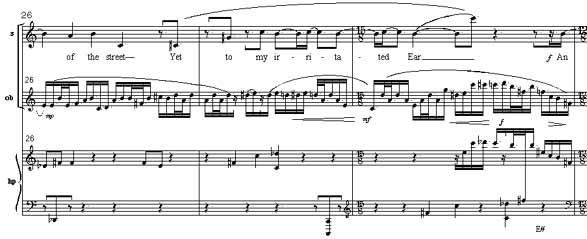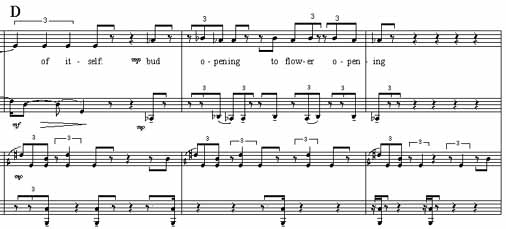
Intro: The Shepherd's Purse—for soprano, oboe and harp

(fragment from page three of the score of movement II)

Intro:
The Shepherd's
Purse—for soprano, oboe and
harp

(fragment from page three of the score
of movement II)

|
Listen to Cliff Crego read the six poems of the cycle [listen in QuickTime or streamed RealAudio| download mp3 | |
MUSIC & POETRY AS A NECESSARY UNITY
In The Circle in the Square performance project, one of the primary problems
addressed is the fragmentation of poetry and music. In the view explored here, poetry
and music form a kind of necessary unity—that is to say that they cannot survive let
alone flourish without one another. Yet only a cursory look at contemporary practice
reveals that poetry and music exist in largely separate worlds, rarely crossing borders
or showing any kind of what I suppose academics might call interdisciplinary interest.
Poets in the English speaking world publish their work in written form, largely for
other poets. And New Music composers in both Europe and America publish their
work by means of recordings—in a remarkably parallel way—also largely for other
composers, or other new music specialists.
Given the tremendous difficulty of understanding the origins of this kind of cultural
fragmentation, which is so characteristic of Western culture at present, I think it is best
to be simple and direct in one's approach. By this I mean: Place both poetry and music
under one roof, so to speak, like two parties of a loving relationship who have somehow
become estranged from one another, and simply make sure they stay there. In other words:
Do poetry; Do music—and then—do them always together. In concerts; in presentations
of every description; and in one's own work as an artist. The key thing is that they
remain together, and that along the way, we become aware of I would argue not so
much new ways of unifying them, but rather new ways of looking at their shared,
common source.
It is in this spirit that I've undertaken the composition of a number of new song
cycles. The Shepherd's Purse—-for soprano, oboe and harp, is the second of these.
The Texts
I: Complaint
To whom shall you complain, heart? Ever more shunned
your way wrestles through the impenetrable
people. The more to no avail perhaps,
because it holds to the direction,
holds to the direction of the future,
to what has been lost.
In the past. You complained? What was it? A fallen
berry of Joy, unripe.
But now my whole Tree of Joy is breaking,
in the storm my slowly grown Tree of Joy
is breaking.
Most beautiful thing in my invisible
landscape, you who made me more knowable
to angels, invisible ones.
Rainer Maria Rilke (tr. Cliff Crego)
go to German text
II: Heart not so heavy as mine
Heart not so heavy as mine
Wending late home—
As it passed my window
Whistled itself a tune—
A careless snatch—a ballad—
A ditty of the street—
Yet to my irritated Ear
An Anodyne so sweet—
It was as if a Bobolink
Sauntering this way
Carolled, and paused, and carolled—
Then bubbled slow away!
It was as if a chirping brook
Upon a dusty way—
Set bleeding feet to minuets
Without the knowing why!!
Tomorrow, night will come again—
Perhaps, weary and sore—
Ah Bugle! By my window
I pray you pass once more.
Emily Dickinson (83)
III: The Broken Ground
The opening out and out,
body yielding body;
the breaking
through which the new
comes, perching
above its shadow
on the piling up
darkened broken old
husks of itself:
bud opening to flower
opening to fruit opening
to the sweet marrow
of the seed—
taken
from what was, from
what could have been.
What is left
is what is.
Wendell Berry
IV: Have you got a Brook
Have you got a Brook in your little heart,
Where bashful flowers blow,
And blushing birds go down to drink,
And shadows tremble so—
And nobody knows, so still it flows,
That any brook is there,
And yet your little draught of life
Is daily drunken there—
Why, look out for the little brook in March,
When the rivers overflow,
And the snows come hurrying from the hills,
And the bridges often go—
And later, in August it may be—
When the meadows parching lie,
Beware, lest the little brook of life,
Some burning noon go dry!
Emily Dickinson (136)
V: A Woman in Love
That is my window. I
just awoke so gently.
I thought, I'm floating.
How far does my life reach,
and where does the night begin?
I could think that everything
around me is me;
like the transparent depth of a crystal,
darkened and mute.
I think I could bring the stars
inside of me, so large
does my heart seem; so very much
does it want to let go of him
whom I have perhaps begun
to love, perhaps to hold.
So strange, so uncharted
does my fate appear.
Who am I who lies here
under this endless sky,
as the sweet scent of a meadow,
moving back and forth,
at once calling out and anxious,
that someone might hear my call,
destined to vanish
in another.
Rainer Maria Rilke (tr. Cliff Crego)
go to German text
VI: Shepherd's Purse
Poverty Weed or Beggar Tick,
some days in the field
are leaner than others.
Let the stalk be strong,
the flower head high
and the seedbox full--
November like a tax collector
will come to the poor,
the cut and the shaken,
with nothing to save
but their paper mittens
and a straw whistle.
In a time of hard money
keep a small purse,
spend little.
Be sure to have more
than one heart,
and you may survive.
John Haines


